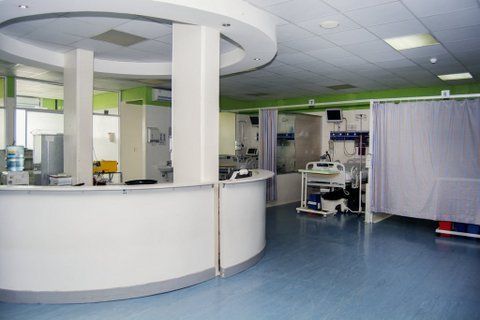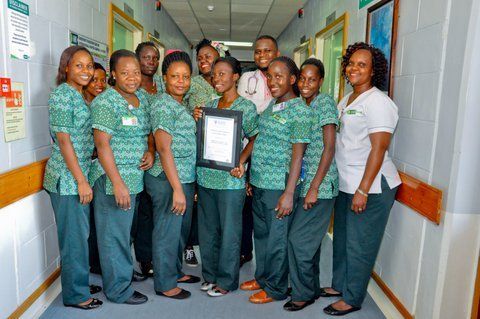
Entrance to the International Hospital Kampala in Uganda
This is according to hospital staff who have been working with the accreditation programme since 2014 and with the Council’s Patient Safety Information System (PatSIS) since May 2015.They have been collecting data to back up their claims.
IHK is the only COHSASA-accredited hospital in Uganda. The hospital has now been accredited for a second time for three years after achieving a score of 97 out of 100 at its external survey.
The Council for Health Service Accreditation of Southern Africa (COHSASA) is the only internationally accredited quality improvement and accreditation body for healthcare facilities based in Africa. In the past 23 years over 550 facilities throughout the continent have entered the COHSASA programme to improve the quality and safety of the healthcare services provided to patients.
IHK first entered the COHSASA programme in April 2014 and received its first full accreditation award in August 2015 with a score of 86 out of 100. The hospital re-entered into the programme soon afterwards and in November 2017, the COHSASA Board accredited IHK for three years when a score of 97 was achieved.
Dr Ian Clarke, Chairman of the International Medical Group, the umbrella organisation under which IHK falls, says: “COHSASA accreditation has been a very worthwhile exercise for International Hospital Kampala since it is one of the few specific medical accreditations and benchmarks that can be carried out by a hospital in Africa. Previously we had ISO certification which was non-specific. We are happy to have full COHSASA certification for the second-time around.”
Commenting on the accreditation process, Ms Jackie Nabukeera, Head of Quality Assurance for IHK says:
“The International Hospital Kampala (IHK) enrolled in the COHSASA programme in 2014. This decision was taken because COHSASA standards were specific to a healthcare setting. We wanted to know how different departments in a hospital were supposed to be operating to implement the relevant internationally-accepted standards.
“As a hospital, we had specific quality problems which included, but were not limited to: documentation, measuring hospital acquired infections, risk identification and mitigation and measuring quality improvement. It was important for us to respond to these issues so that continuity of care and appropriate interventions for the patients could be made.
“In addition, the web-based CoQIS quality information programme generated data that could be collected and analysed to inform different quality improvement projects.
“However, as with any new programme, there were challenges: poor staff buy-in and lack of adequate knowledge to drive the hospital’s QI programme to mention but a few. This meant we had to make concerted efforts to communicate the importance of the quality improvement programme at staff meetings and training staff to equip them with the knowledge they needed to steer the QI programme. We also needed to collar the support from the executive and senior management team.
“Being consistent in spreading the message and providing training has proved to be fruitful and has resulted in our second COHSASA accreditation.”

The ICU Unit at IHK Hospital in Uganda
Ms. LILIBET BYAKIKA, Unit Manager, ICU
“The Quality improvement and accreditation programme has positively impacted patient care in our unit in various areas. Many measures in relation to infection control have been implemented since 2017. They include hand washing and the use of checklists for both placement and monitoring of indwelling devices. Audits have been done to ensure compliance with these new measures.
“Infection control has been a great success because we have been pushing hand washing, where techniques have been mastered and practiced by staff and the patients’ attendants. Through hand washing audits we have been able to monitor compliance among the staff. This has reduced cross infection in our patients and there is a massive reduction in the rates of nosocomial infection.
“Similarly, the use of central venous catheter checklists and protocols and monitoring of all other invasive lines have aided greatly in the prevention and reduction of infections.
“Notably, medical errors are too often a cause of death. Monitoring and reporting of critical events using COHSASA’s Patient Safety Information System – PatSIS – and morbidity and mortality audits have greatly improved our knowledge of critical care and made us better practitioners than before.”

Staff Members of IHK Accident Emergency Department (from left to right): Ms Angwena Charlotte, Dr. Precious Ndomerire, Ms. Immaculate Ndagire, Ms. Dorah Nakamwa, Ms. Peace Kwiocwiny and Ms. Damalie Nalugwa.
Ms. EVA NAMBUGU, Ward Manager Obstetrics & Gynaecology
“COHSASA standard assessment manuals specify what needs to be in place and how it should be done. From a multidisciplinary point of view, the standards have helped our department to receive prompt and efficient services from other essential service areas and departments of the hospital.
“When it comes to assessments, the standards have helped the department to do self-assessments to identify gaps and find possible ways of closing them; for example: protocols, guidelines, tools and checklists have been developed to correct the gaps and reduce mistakes. Risk assessment registers have helped to quantify risks and incidences and inform us to what extent protocols are being followed.
“The programme has also improved our ability to obtain meaningful data collection and analysis which has set a basis for continuous improvement.
“We have been able to monitor performance competence by using the checklists we have put in place. Due to the care tools, guidelines and protocols we have developed we are able to assess the quality of care we render to our clients. When incidents occur, we investigate the root cause and then work to mitigate them.”

Maternity Unit Staff (front row from left) Ms Victoria Nambaziira, Ms Juliet Nagulani, Ms Tedy Nabasajji, Ms Florence Nambakire, Ms Resty Nansubuga, Ms Sophia Namaganda and Mrs Kyeyune Eva Nambugu. (Back row from left): Ms Annet Nakaddu, Ms Ray Clara Rijoo, Ms Betty Sharon Awubire and Medical Officer, Dr Ivan Kabuye.
Ms. PEACE NATIMBA, Unit Manager, Medical-Surgical Ward
“The COHSASA Patient Safety Information System – PatSIS – has created transparency in the medical-surgical ward and challenges in the unit are being sorted out with ease. For example, because of reporting these near-misses and incidences, the administration has helped fix our nurse-call system and currently they are purchasing new equipment for the unit.
“More so, near-misses and adverse incidences are being managed head-on since the unit members feel free to report them in the system. These have all aided the provision of quality care to our patients as well as increased their satisfaction with our service.”